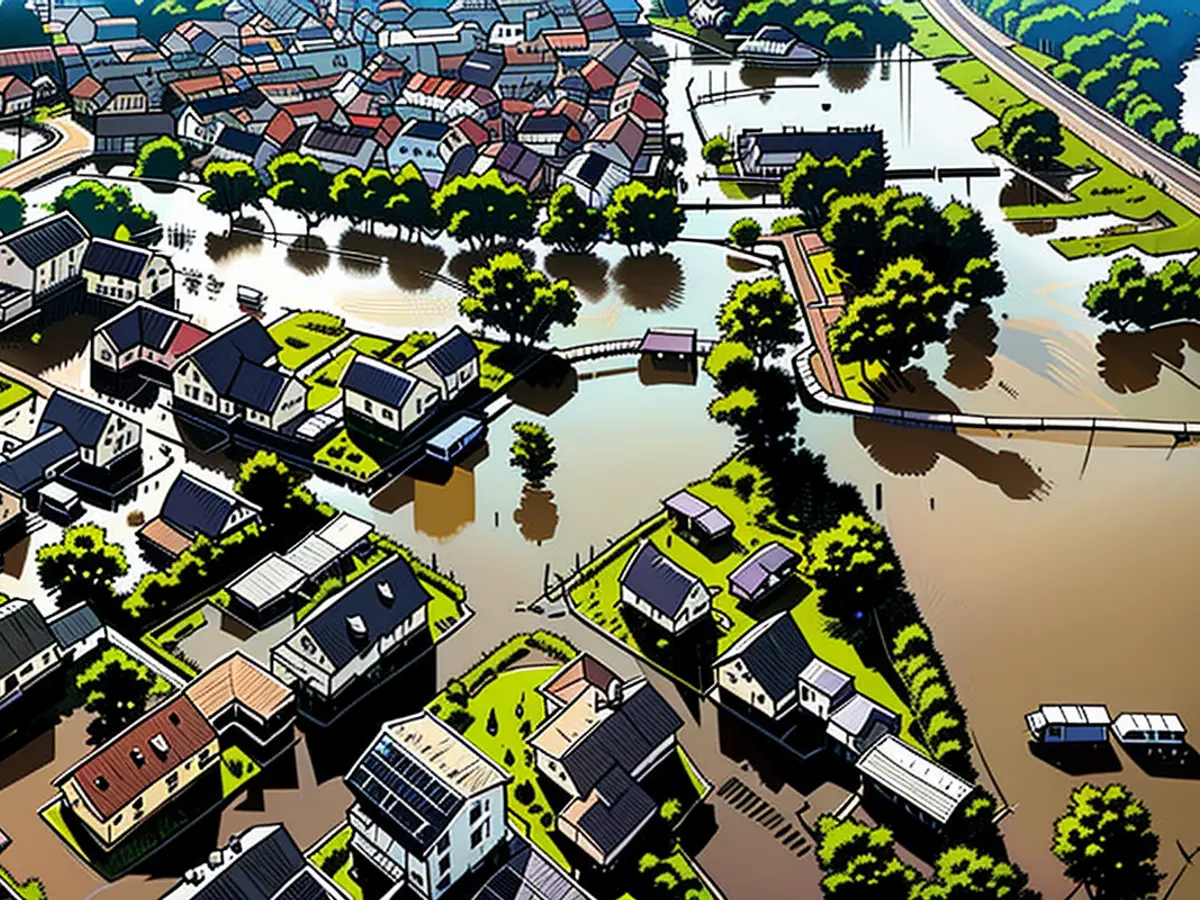In flood zones, properties can experience up to a 25% reduction in worth.
The devastating floods in the southern regions of Germany are not only emotionally tragic for the affected residents, but also financially detrimental, lasting for years. How much of a role does climate change play, and what steps can be taken to prevent it, Professor Steffen Sebastian discusses in an interview with ntv.de. Focusing on the impact on real estate and its financing, he strongly believes that property owners themselves must bear the risk.
What's the effect on the value of these properties? ntv.de: The houses impacted by the floods in Germany's southern regions are losing considerable value due to the damage on-site. Just how much are we talking about?
Steffen Sebastian: At present, these properties are almost unsellable. Prospective buyers are extremely cautious after such flood disasters, resulting in significant price drops. Damaged properties have estimated losses of approximately 20-25% of their original value.
Are properties in these regions less affected in terms of value compared to, say, those in the Ahr Valley or Saarland?
For sure. A riverfront property in Regensburg will always attract buyers or tenants. For example, medieval cities might face a bit of damage, but the structure of the buildings itself is likely to remain unharmed. Wealthier real estate owners in high-price areas can more easily cover the costs of flood damage.
Is the value loss permanent?
Yes, over time people tend to forget about it. According to previous research, five years after a natural disaster, affected properties typically lose around 10% of their value, and there's no difference after ten years.
Is this dynamic changing with the increasing frequency of natural disasters?
Possibly, as the global warnings about impending catastrophes are becoming more frequent and urgent, the public's sensitivity to such events is also rising. Besides floods, we're also witnessing stronger storms and hail. If the state is more proactively involved, perhaps it could prevent these incidents.
What do you think about a liability insurance against natural disasters, with many now demanding it?
I find it frustrating that taxpayers keep footing the bill for the individual mistakes of real estate owners. Politicians have been quick to promise financial aid before elections. It'd be better if the state didn't have to cover the consequences of its own decisions. It's concerning that every year, approximately 1000 houses are built in areas with flood potential. It's alarming how little progress has been made since the flood disaster in the Ahr Valley.
So you're in favor of a liability insurance?
It's less than ideal, but if the state can't bear the brunt of its own decisions, a liability insurance similar to health insurance could be an alternative. Although not applicable to all properties, it would make sense for risky areas. In Germany, there's detailed information available on flood risk. Anyone choosing to live in these regions should be responsible for their decision and its consequences.It's puzzling why taxpayers should shoulder this burden.
Does this only apply to floods?
Yes, also applying to heavy rain and hail, as we have quality data on those as well. However, a liability insurance may not align with the FDP's ideals of complete freedom, but it fits the political landscape, and it may be expensive for the affected. Hence, the state should ensure insurers aren't being abused, and provide opportunities for reinsurance. It's feasible to insure against hurricanes and nuclear power plants – thus, we can insure against flood-prone regions, as well.
Would a liability insurance have any benefits for real estate owners?
A liability insurance would compel real estate owners to take more extensive safety measures, for instance, securing their buildings against heavy rain. If someone does this, they could receive lower insurance premiums. Also, those affected would be more informed about the potential consequences of natural disasters, like the damage a hailstorm would cause to solar panels.
Is the real estate market negatively impacted by climate change?
So far, there's not been a significant impact. We've mostly focused on energy-efficient measures in real estate, but are overlooking the protection against rising temperatures and possible extreme weather events like flooding, hail, or heavy rain. This shift in priorities is needed. Heat, for example, hasn't been a consideration so far, mainly focusing on temperature control systems.
Which German regions are most threatened by the impacts of climate change?
South Germany, due to proximity to the mountains, is susceptible to floods and hail, with the added issue of humidity. We have detailed data on these dangers, but the risks haven't reached the population's awareness yet. Perhaps mandatory disclosure at the notary level during property transactions would be a good idea.
What advice would you give to real estate owners and buyers?
Conduct research on the natural risks associated with your property and, if required, insure or protect them. It's also essential to consider the potential consequences of increased natural disasters or hotter summers in the future.
What preventative measures are effective?
To protect properties, suitable options include installing effective stormwater management systems, elevating properties or building foundations, and landscaping properties to redirect water flow away from buildings. In addition to these infrastructure solutions, it's crucial to educate the public on the dangers.
To understand the impact of a cellar flooding, it's crucial to know what measures can be taken such as window sealing. While technical centers don't necessarily have to be in the cellar, in case of a breach, contemplating relocation is essential.
Recently, the University of Regensburg faced flood-related issues. Living through this event, I learned that a thorough response system is crucial to prevent further destruction. In this case, mobile water barriers were utilized effectively. It's inspiring to see such preparation, making it a fast process when needed.
Leaving the university, I was confronted with the reality of this situation. A train delay of 1.5 hours was a direct effect of these floods, but the water level was gradually decreasing. Overall, Regensburg's preparedness averted worse scenarios.
Dealing with the extent of the damage is now underway. The drying out process is continuing, and permanent damage will be determined. It's estimated that the cleanup process will take months. However, it's important to note that the situation pales in comparison to events in Ahr Valley or the Elbe flood of 2002, when efforts to mitigate these disasters made Gerhard Schroeder a notable figure in tackling crises.

Read also:
The text discusses the impact of extreme weather events, such as floods, on property values and the role of climate change in these events. It mentions that properties in flood zones can experience up to a 25% reduction in worth, and that this reduction can last for years. It also discusses the potential for liability insurance against natural disasters and the need for property owners to take safety measures to mitigate the impact of extreme weather events.
Here are three sentences in English that contain the given words and follow from the text:
- Climate change and natural disasters, such as floods, pose a significant threat to property values in flood zones, leading to a reduction in worth that can last for years.
- As extreme weather events become more frequent, liability insurance against natural disasters is increasingly being demanded, as it can help property owners cover the costs of damage and reduce the financial burden on taxpayers.
- To protect properties against flood damage, property owners can take preventative measures such as installing effective stormwater management systems and elevating properties or building foundations.
- Opel has been manufacturing automobiles for a staggering 125-year duration.
- Few cars weigh under a ton in present times.
- Lack of snow also opens up new opportunities for winter tourism
- Abrupt end to e-car subsidies








